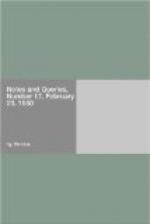Some of your correspondents have taken up the not unnatural idea, that the last syllable of the word “Armagh” is identical with the Celtic word magh, a plain. But there are two objections to this. In the first place, the name is never spelt in Irish Armagh, nor even Ardmagh, but always ARDMACHA. Ardmagh or Armagh is only the anglicised spelling, adapted to English tongues and ears. It is therefore clearly absurd to take this corrupt form of the word as our datum, in the attempt to search for its etymology. Secondly, the Irish names of places which are derived from, or compounded of, magh, a plain, are always anglicised, moy, moi, mow, or mo, to represent the pronunciation: as Fermoy, Athmoy, Knockmoy, Moira, Moyagher, Moyaliffe (or Me-aliffe, as it is now commonly spelt), Moville, Moyarta, and thousands of other cases. And those who are acquainted with the Irish language will at once tell, by the ear, that Armagh, as the word is pronounced by the native peasantry, even by those who have lost that language (as most of them in that district now have), could not be a compound of magh, a plain.
The work of M. Bullet, quoted by your correspondent “HERMES,” is full of ignorant blunders similar to that which he commits, when he tells us that Armagh in compounded of “Ar, article, and mag, ville.” The article, in Irish, is An, not ar; and mag does not signify a town. He adopts, your readers will perceive, the modern English spelling, which could not lead to a correct result, even if M. Bullet had been acquainted with the Celtic languages. The same remark applies to the explanation given by the author of Circles of Gomer. Ard, not Ar, is the word to be explained; and therefore, even though Ar and Ararat meant, as he tells us, “earth, country, or upon and on the earth,” this would throw no light on the etymology of ARD_macha_.
“HIBERNICUS” (No. 14. p. 217.) is partly right and partly wrong; he adopts the anglicised spelling of the second syllable, although he seems aware that the first syllable ought to be Ard; and he admits also that this word is a substantive, signifying a height, not the adjective high. “A high plain,” in Irish, would be, not Ardmagh, or Ardmoy (as it would have been anglicised), but Magh-ard (Anglice Moyard). Great light will be thrown on the whole subject of the etymology of Irish typographical names, when the Index to my friend Mr. O’Donovan’s edition of the Annals of the Four Masters makes its appearance.




